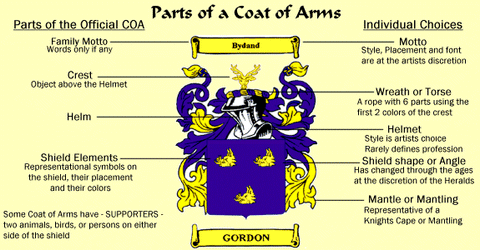Parts of a Coat of Arms
Posted by Jeff Ezzell on

Formally known as an achievement, armorial achievement, or heraldic achievement, what is commonly referred to as a "coat of arms" consists of several parts: the shield, the mantling, the helm, the wreath, charges, and the crest (note that not all arms have crests).
The Heraldic Description of a Coat of Arms
The official, written description of the coat of arms is called the "blazon of arms," such as "azure, a fess argent between in chief two fleurs-de-lis and in base a lion passant of the same." The blazon may seem like a foreign language, but it is simply a system of code words to denote colors, placement, and styling by using an economy of words.
Much of the design for a modern depiction of a given coat of arms is more the artist's preference or the style of a particular herald, and not a part of any particular blazon. The mantling and the banners for names and mottoes, for example, are not an official element of the blazon of arms. The helm, likewise, is not a part of the official blazon. Some historians attach a significance to the design of the helm or helmet as representative of a certain century or social status, but there are differences of opinion on this matter.

